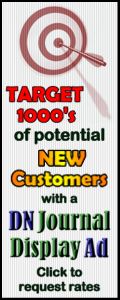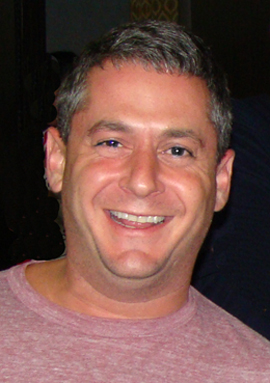|
Though
he became wildly successful in the business world, few
who knew him in his youth, nor even Ferber himself,
could have predicted how much he would accomplish. John
was
born in 1974 and raised in Owings Mills, Maryland,
a suburb just north of Baltimore. The youngest of three sons, his father (who is now
retired) was a tax attorney and his mother a real
estate agent. "I was very fortunate to grow
up in a loving household with conservative but
very supportive parents," Ferber said. "My
father worked very hard to provide a better lifestyle
than he experienced growing up for our family and
while I was young and growing up, his strong work
ethic was probably the farthest from how someone would
describe me back then. Throughout school
growing up I never applied myself very much towards
things like studying or sports. I would describe
myself as a coaster, always doing the bare
minimum required in order to progress to the next
grade."
"I
was fortunate that I didnít have to study very much
and could still pull off a solid B average. I
knew that if I studied more, I could pull off A's,
but I didnít have a strong motivation to do
so," Ferber said. Part of the reason for that was
the role computers played in his life from a
very early age. "I was one of the first
generation of kids to grow up with a computer pretty
much from 1st grade," John said, adding,
"I also was one of the first generation to grow
up with video games, etc. My first sports
related injury was probably my thumb hurting from
pressing the keys too hard on the Nintendo game
system controller back in the late 80s!"
|
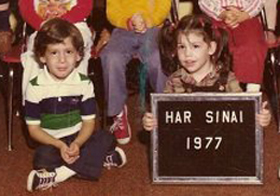
Within
three years, 3-year-old John
Ferber (at left in the nursery school
photo above) would be introduced to computers
for the first time. |
Ferber
was first introduced to computers around 1980 when as
a six-year-old he recalled watching his brothers and
father solder together a Heath Kit computer
that they had purchased from a mail order catalog.
"I became mesmerized by the amazing
capabilities of the computer," Ferber said.
"I spent hours trying to load software programs
from cassettes that had to be perfectly synced in
order to load properly and playing these mind numbing
"Choose your own adventure" type games that
required you to type commands like "look
left", "walk forward", etc. in order to
find clues and progress through the games."
"In
first or second grade our elementary school opened up
something called a Computer Lab and my class
was the first to be introduced to the computers there.
They were all Radio Shack TRS80s and I somehow
persuaded my |
|
parents
to buy me one and next thing I
knew I was inseparable from it. I spent my
third grade summer at Radio Shack Computer Camp
learning how to program it. I fondly remember nagging
my father to buy me accessories such as remote hard
5.25 inch hard drives and these Epson dot-matrix
printers that would weigh like 25 pounds and cost more
than the computer itself!"
|
|
"Around
the same time, my oldest brother Larry (now
a Thoracic/Vascular Surgeon) was
entering college and majoring in computer science and
my father bought him an IBM-PC Clone. This
opened the world to me - to better computer
games, but more importantly to Bulletin Board
Systems. Some of you may be too young to remember,
but the predecessor to the internet today was
these BBS's which would enable people to communicate
in forums, chat, download software, etc. There was a ComputerLand
store in our town and they were operating a node of a
national BBS called Fido Net. I think they were
like node #2 or #5 and the guy at the store gave us
the software and we became one of the earliest Fido
Nets around. I remember spending every waking
minute of my elementary school summers glued to
the computer, yakking it up with people. There was a
local guy nicknamed "Spiderman" who
my brother and I used to speak with and we decided to
meet him one day at a local mall. I'll never forget my
brother's shock and surprise to see this
10 year old kid show up! It was an early
experience of the fascinating components of anonymity
that the future internet would provide," Ferber
said.
|
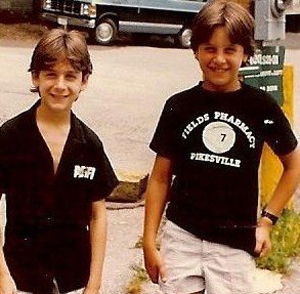
10-year-old
John Ferber (left) with
boyhood and lifelong best friend
Michael Barnstein at a time when
John was already hooked on
computers. |
|
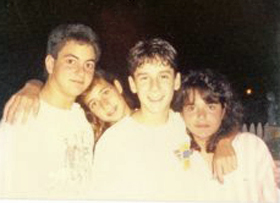
Senior
John Ferber (3rd from left)
with friends from his Pikesville
High School class of 1992 |
Still,
Ferber's love affair with computers cooled a bit when
he started having hardware problems with his TRS80.
Developing an interest in other things teens do like
girls, music and sports also led to a period of
several years in which John said he barely used a
computer. Still old flames can be hard to forget and
Ferber's passion for computer would be rekindled after
he left high school, though there would be several twists
and turns along the way.
After
high school, Ferber and a friend bought a camper van
and spent six months traveling across the country.
When that adventure was over Ferber headed to Boca
Raton, Florida where he enrolled at at
Florida
Atlantic
University, a school located only a mile or so from
the
beach. "Admittedly, I wasnít ready for
school and found myself spending more time on the
beach than in class," Ferber said.
"Ultimately |
|
my grades lacked and I decided to
move back to
Baltimore
where I wound up going to
Towson
State
University. I had the typical random college jobs,
telemarketing, delivering pizzas, etc., but I had a
hard time working for someone else. At one job
as a short order chef, the manager tried to make an
example of me by insisting I wore this ridiculous
hat. He picked on me because I was the new guy and
all the existing people wouldnít wear the hats
either. Long story short, after a heated exchange I quit
on the spot, leaving in a huff with several
burgers and hotdogs on the grill." |
"I
remember my father saying that he always thought I was
going to have to work for myself in some
capacity. He identified this in me much earlier than I
was able to understand it, but the bottom line is that
when asked to do something, I would bend over
backwards to please the requestor, however when told
to do something I had an acidic reaction and would
do things very begrudgingly," Ferber recalled.
Ferber
soon found a solution that worked for him. "In my
junior year in college I started buying used computers
and then re-selling them and also started doing
"Internet Set-Up" consulting for other
college students and small businesses. Just getting on
to the internet back in the mid 90's was a very
challenging thing to do! I found myself really
enjoying this new business because I was my own
boss and I alone affected how successful I could
be. At the same time I was pursuing a degree in
Psychology and have always felt that it was a great
degree to obtain because psychology is the study of
people and why we do the things we do. Business is all
about people, so I've always felt my degree helped
me in business by understanding people's motivations,
decision making, etc."
|
Ferber's
love for computers also re-surfaced during his college
years. "When I
was preparing to go to Florida Atlantic my
father bought me a used PC Clone that I could take to
college primarily for doing word processing. However
at the time (1992), online services like Prodigy,
CompuServe and AOL were becoming all
the rage and I soon became hooked on Prodigy in
particular, spending hundreds of hours on there,
exploring and chatting. Around 1993 or 1994 I heard of
the World Wide Web for the first time. I can
remember wasting hours trying to get modems to work,
online services to connect, configurations to work
properly, etc., but once I was online and connected I |
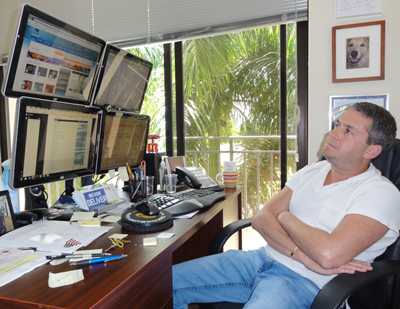
John
Ferber in his Delray Beach, Florida
office (April 2011) |
|
was absolutely amazed and transfixed about the
realm of possibilities the WWW presented," Ferber
recalled. |
"During
my last semester in college I met another gentleman
online who was developing one of the first video games
ever designed to be played with multiple people over
the internet. I joined forces with him to market
and distribute the game. This was in 1996 and the
internet was still a scary big black hole and while
thousands of people loved playing the free version of
the game, very few were purchasing a license. After
about 6 months working together we decided to pursue a
strategy of selling advertisements in the game.
We spent 6 more months trying to drum up interest in
advertising in the game when a seminal moment
occurred to me. I was speaking to an operator of an
online casino as they were some of the largest
advertisers back then, and he basically said to me,
"Kid I could give two shits about advertising in
your game, however the software you developed
to track and measure the effectiveness of the ads
is very interesting to me. "Long story short I
ultimately ended up developing what would become known
as white label affiliate management software. I
sold the software to countless online advertisers and
was doing quite well all at the age of 23,"
Ferber said.
|
Suddenly
all of that time he had spent fiddling around with
computers as a child started to look like time well
spent. "A book I read called Outliers
was based on the notion that most highly
|
|
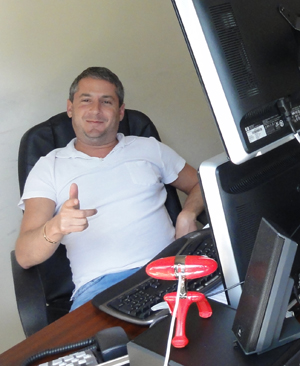
|
successful
people are the product of at least 10,000 hours of
training in their respective field, so in retrospect I
can see now that all those countess hours up late at
night, eating Triscuits, exploring the never ending
possibilities and wonders of what a computer and the
internet can do ultimately led me to where I am and
what I do today," Ferber agreed.
"I had
always had a notion in the back of my mind that my
ultimate career would be computer related, but
until my life developed in real time, I never had any
inkling as to how exactly that would manifest. I only
had 2-3 advertising/marketing courses that I took in
college, so arguably I wasnít trained like most
people for a career in advertising. Had it not been
for my time spent online, on the WWW, playing games,
trying to sell advertising in something that was
extremely foreign at the time, etc., I donít think
my path would have ultimately led to where I am today,
yet this was the only path I knew to take.
Overall I've lived my life then and really to some
extent still today by the seat of my pants." |
At
the same time John enjoying his first taste of
professional success at 23 his brother Scott was busy
working for financial giant Capital One - a
company famous for pioneering information based
marketing, especially in the credit card space. Ferber
said, "Over a number of discussions at family
gatherings a combination of ideas that Scott and I
shared ultimately led to us deciding to create a
company that didnít focus on the licensing of
the advertising software, but instead on the buying
and selling of advertising itself, taking
advantage of an opportunity to apply optimization
theory and models to online display advertising.
At the time, no one else was thinking about this. Everyone
was focused on tonnage, but very little on value."
Ferber
added, "Scott received his bachelors and master's
degrees in Systems Engineering which is basically the
science of finding optimal solutions to real world
business challenges. We knew that the internet
presented a very unique opportunity for marketers
because of its hyper efficiency and track ability. For
instance a direct mail campaign usually takes 3 months
to measure whether it was successful or not, today via
email marketing it takes hours and can also be
modified based on response in real time, versus
having to wait 3 months. Plus, with display
advertising, an advertiser was able to track the
efficacy of each individual ad impression and
then be able to model against it. This is one of the
true inherent components of internet advertising that
makes it so powerful for marketers. Until the
internet only direct mail provided comparable
capabilities, however direct mail is much more
expensive and time consuming than internet
advertising."
|
"By
mid-1998, the idea for Teknosurf (later renamed
Advertising.com) was born and we launched around
October 1998. Our principle product was an "Ad
Network" that advertisers could purchase
advertising on primarily on a Cost Per Click basis.
Through
Scott's Systems Engineering degrees as well as a
relationship with his mentor from Stanford
University
we were the first company to really apply and
focus on optimization of the media placement process
online. Over the years we added more product lines, at
one point having the largest Owned Email Newsletter
Database, Email Newsletter Ad Network, Affiliate
Network, Search Engine Management products and
more," Ferber said.
Acquisition
of a new domain name - Advertising.com -
would also play a key role in the explosive growth of
John and Scott's new company, but it took awhile before the power
inherent in that great name was finally put to
use.
"We
only decided to change our name to Advertising.com
after we were getting increasing reports from our
sales folks that the name Teknosurf was not
intuitive to what we did and in a world where you
had 30 seconds to pitch who you were and what
you did, it was creating challenges for our sales
force. We had
|
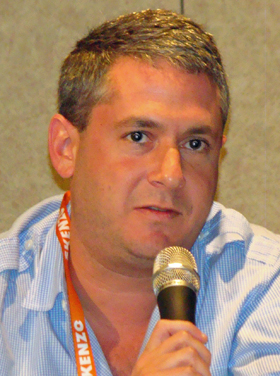
John
Ferber speaking at the
T.R.A.F.F.I.C. South Beach conference
in Miami (October 18, 2010) |
|
acquired the Advertising.com
domain sometime around the middle of 1999 from a
company who had originally wanted $1 million
for it. We passed at that price but they found
themselves in a distressed situation soon thereafter
and we had an opportunity to acquire it for $100,000,
provided we could wire the money the same day.
We decided to buy the name but had zero intention at
the time to change our name to Advertising.com. The
simple fact was we acquired it because we felt safe
knowing that it would always be worth at least 100k -
it was more of an investment than a strategic
purchase at the time. However, by late 1999 plans were
in motion to change our name to Advertising.com,"
Ferber said. |
"The
company created/pioneered/innovated many things during
our tenure there, but we are best known for basically inventing
and having the best placement optimization
technology ever developed. When it came to display
advertising no other company could match the power of
our technology to place ads so effectively enabling us
to pay the highest rates for advertising inventory and
sell to the most advertisers because our solutions
were the most favorable in the market. To this day the
technology is still the leading placement
technology available online and Advertising.com is
still the world's largest reach vehicle for advertisers
as measured by Comscore. There was a period of
about 7 years where we were number 1 every month.
When I left in 2006 I had calculated that we reached
on average 90% of everyone on the internet, an
average of 20 times PER DAY!," Ferber said. We
were the "Intel Inside" of the Online
Advertising industry - touching everyone but
with very little brand awareness to the average
consumer."
Of
course, Advertising.com's success did not go unnoticed
and before long America Online took a keen interest in
the company - something that Scott Ferber had
predicted would happen years before the landmark sale
occurred in 2004.
"Scott predicted our sale to AOL back in 1998!," John marveled. "I remember vividly a
conversation with him where he was telling me, that if
we can accomplish, A + B + C that in 5 years or so a
company like AOL would come around and want to buy us
for about $500 million. At the time it just sounded
like an amazing pipe dream, but when this
unfolded in reality in front of me I am still
amazed at my brotherís prescient ability to predict
value creation. It's not that he is a modern day Nostradamus,
it's that he has incredible business skills that
enable him to recognize value when it's being created
and envision how it scales and lead the way to
realizing the potential of the technology and value
proposition we had created."
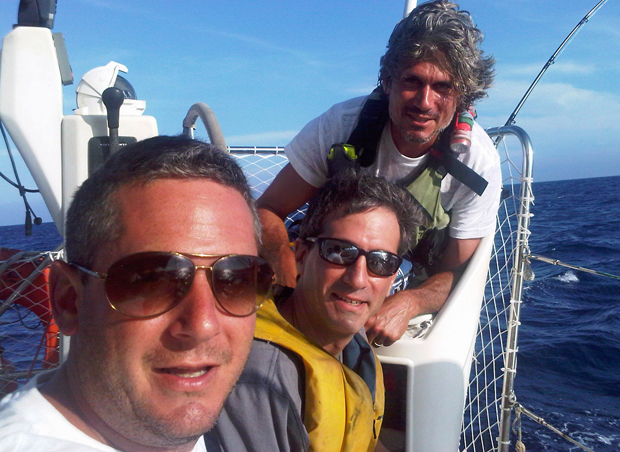
The
Ferber Brothers (left to right) John, Scott
and Larry
on a fishing trip in Puerto Rico (April 2011)
"Our
first real tangible experience with AOL occurred in
2001 when they were investors in our Series E Funding
round, and after they had made the investment it was
basically impossible to get any meaningful attention
from them as they were going through the various
interior issues resulting from the Time Warner/AOL
Merger. Basically two years went by and we
couldnít get any traction, then starting in the fall
of 2003, our media buying team struck up a commercial
relationship with them and we started buying
increasing amounts of their advertising
inventory," Ferber recalled.
"
Around New Year's 2003/4 I remember driving down the
road on a vacation in Florida and our head of
Publisher Services at the time - an amazingly talented
woman named Nada Stirrat - called me, very
excited to tell me that AOL wanted to come visit our
HQ in Baltimore. This was unusual news to us and as
such it was my first "feeling" that
something more than a commercial relationship could
potentially develop. Fast forward a few weeks and
about 10 AOL execs came from their Dulles HQ
and spent the day visiting us. I remember it was a
magical feeling meeting for all of us and I
could just feel something special was potentially
developing. At the time I actually had long hair,
it was long for 10 years but, true story, at the end
of the day after that meeting, I went and cut all
my hair off!," Ferber laughed.
|
"The
story gets more complex!," Ferber conitinued.
"At the same time this was going on we had
decided to raise approximately $100 million in
an IPO and take the company public. So as such
we were spending a lot of time meeting with bankers,
drafting our IPO materials, etc. Simultaneously with
each passing week in that winter of 2004, AOL became
more and more interested in our company. Finally
in the spring we had to make a choice as to whether to
continue to pursue our IPO or perhaps an acquisition
by AOL. Of course we couldnít insist AOL
acquired us, so we basically had to tell them if they
were interested in acquiring us they had to put in
an offer or otherwise we were going to have to
focus 100% on going public and wouldnít be able to
entertain any more conversations with them until after
that point." |
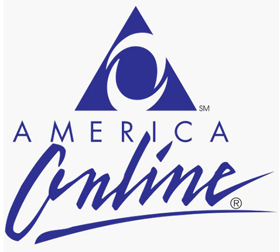
|
"Then
one night in April 2004, my brother received a phone
call late at night from someone at AOL telling us to check
our fax machine. At the time we lived about 15
houses apart and my main method of commuting to work
was an 18 foot deck boat that I'd park at the dock at
our office building. We set out late at night to make
the cross harbor crossing with my dog Cody at
the front of the boat, and we got to the office, to
find out that the fax machine was locked in the
office of our general counsel! A few feverish minutes
later we were able to reach him and find out a spare
key was hidden elsewhere in the office. We raced to
find the key, open the door and grab the fax out of
the paper tray. In the tray was a one page letter,
two paragraphs in total, that basically said they
thought we had a wonderful company and they'd like to
acquire it for $425 million in cash!"
"It
was an incredibly surreal moment. We had some
buy-out offers in the past, most notably a company
would FedEx an offer to us every 4 weeks or so for the
previous year with an ever increasing amount, but the
highest they had offered was maybe $200 million.
This offer was much more substantial and just felt
real, and I could tell it was different because my
brother didnít dismiss it right away as he did the
others. The next morning we had informed our IPO
bankers (Goldman Sachs) and by noon of that day
the offer stood at $495 milllon in cash for the
company."
|
"It
was an incredibly tempting offer and at the time you
have to keep in mind that this is before Google
went public, and the stock market still had not
recovered fully from the dot.com crash, and
while we had solid fundamentals and 6+ quarters of
profits, etc., the world was a place of uncertainty
back then, and we had no idea how well our IPO would
go, et. Next we called a board meeting and had a long
discussion about what to do. Ultimately, the lure of
the all-cash offer
|
|
was too attractive to pass up.
The rest of the process was pretty quick, we signed a
sale agreement and about 45 days later the
transaction was completed, the cash was in the bank,
and Advertising.com was now owned by AOL/Time
Warner. The negotiations and due diligence process
was pretty amicable and overall the folks at AOL were
very welcoming, kind and open to us," Ferber
said.
The
day after the company was acquired I had a
private
meeting with my brother and he asked me, "What
are you going to do next?" At the time I really
had no idea, things were pretty overwhelming
and I hadn't given it much thought, although
admittedly staying with the company indefinitely
wasnít on top of mind, neither was leaving. I told
my brother I didnít know and asked him what he was
going to do and he replied, "I'm going to work my
ass off for the next two years so that in 5 years the
folks who acquired us will look back on this deal and
say it was the best deal they have ever done". I
was blown away by that statement. In
retrospect I realize he was testing me. AOL offered us
a little stock and cash to stick around, but
comparatively it wasnít much, however |
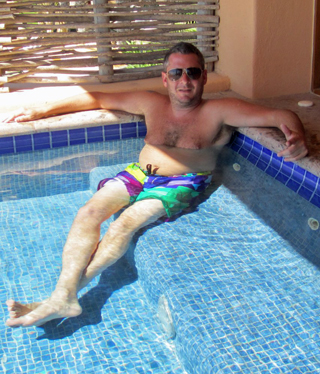
After
selling Advertising.com to AOL
for $495 million, John had the
freedom to do anything he wanted. |
|
my brother
with his incredibly strong ethics and morals instilled
in me the importance of seeing things through
and that your reputation is the most
important thing you have in life. As such we both
stayed with AOL for 2 years seeing through its
acclimation with AOL," Ferber said. |
"It
ultimately became very hard for me to leave, as when
something is all that you have done and all that you
know for the past 8 years of your life, you grow attached
to it. It wasnít just a company, or a technology
platform, it was a group of hundreds of people whom I
have grown close with and cared about and considered a
part of a big extended family (spread across 15 office
in 8 countries around the world). You've probably
heard before the phrase that a company is only as
good as the people running it. I learned
from direct experience how true this was. Yes
we had great technology, but it was people who
created it. Yes we had great clients but it was our
sales and business development folks who nurtured the
relationships over time."
"Today
the company has evolved greatly. Some of our first
co-workers are still there, meaning that today they've
worked at the company more than twice the time I was
there - that's a pretty crazy feeling to feel like
you've created something that lasts longer than your
own tenure there. They are still the number #1 reach
vehicle in the world for advertising and last time I
heard they were serving more than 10 billion ads
per day (compared with about 1 billion when I left
in 2006). I know it's been an emotional roller
coaster being tied into the trials and tribulations of
the parent company, but at the end of the day the
services they provide provides true inherent ROI
value for their customers and I think the
employees take a lot of pride in that," Ferber
said.
|
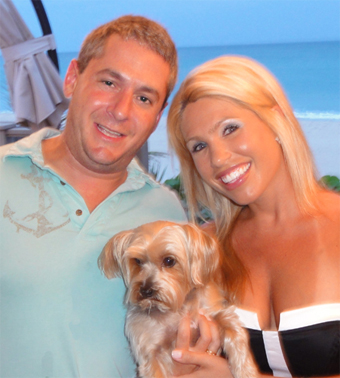
John
Ferber, his girlfriend Jenna Wehner and
their
Yorkie, Mason, at home in Boynton
Beach, Florida |
With
the gargantuan sale behind him and his work with AOL
done, Ferber now had an unlimited horizon
before him. What does someone who has sold a company
for hundreds of millions of dollars do when they have
the resources to do just about anything they could
imagine?
"Scott
and I both
left in May of 2006 and spent the next few
months basically decompressing," John said.
"I took a trip to Europe
, Scott spent time with his family, etc. When we had
sold the company one of the first things I did was
acquire a vacation home near where I lived when
I went to Florida Atlantic (Editor's
note: John graciously hosted a gathering
of the South
Florida Domainers Group at that home on
the evening of March 31, 2011). At the time of
purchase I had no plans to live there full time, but
by the time I left Advertising.com I had decided to
kind of start from scratch and decided to relocate
down to Florida," Ferber said.
|
"I
spent the next few months just kind of exploring South
Florida and getting to know the area, etc. I was
starting to itch again to be involved with
something, as I'm not one to sit idly by and do
nothing for long. As I get older I get more and more
impatient with doing nothing and find that I have to
literally always be doing something from the moment I
wake up until I go to sleep, otherwise I go a little stir-crazy."
"In
January of 2007, I met my future business partner Jason
Boshoff at a mutual friendís birthday party and
instantly I knew there was something I really liked
and appreciated about him. As well, separately around
that time, I met Erik Simons, another internet
entrepreneur and all around just a great guy, great
thinker, strategist, product oriented guy. After a few
months I decided to essentially set up an incubator
to develop some new business ideas and concepts and
see what we could make out of them. Thus was born Vandelay
Industries. Seinfeld fans will
recognize that name as the name of the fictional
company that George Costanza claimed to work
for in a few episodes. As a huge Seinfeld fan I found
the .Com available for sale and we hung our
corporate shingle up as that," Ferber said.
"As a funny aside, the
day we started operating as Vandelay we called Fed-Ex
to setup an account and their response was "sorry
we can't setup accounts in the name of fictional
companies" - then we called Geek Squad and
they basically said the same thing. We realized maybe
not everyone would appreciate the name as much
as we did, LOL! Anyway, technically Vandelay is just a
holding company for my personal ownership in a
few companies I either founded or invested in."
|
Last
year Ferber branched out further, taking a big leap
into the domain industry by co-founding Domain
Holdings Group. "Domain
Holdings Group is a merger of some of the business
units from one of my companies, USONetworks,
and the technology platform created by my partner Chad
Folkening. I had met Chad
in 2007 and we have developed a non-working friendship
over the past 4 years, which is great, because it's
great to get an opportunity to know someone on a
friend level before you become business partners with
them," Ferber said.
"Chad
has been a domainer since pretty much the beginning
and has one of the top portfolios in the world.
USONetworks was doing some premium domain development
and after a series of conversations Chad and I decided
to merge his technology platform with our business
units providing premium domain development, SEO, and
SEM together to form Domain Holdings." |
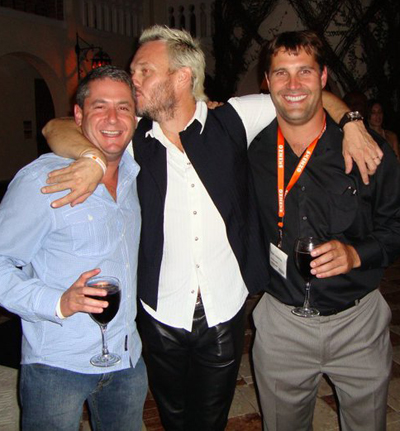
John
Ferber (left) and partner Chad
Folkening (right)
get some love form legendary domainer Frank
Schilling at the T.R.A.F.F.I.C.
South Beach
conference in Miami (October
2010) |
"Our
mission is to become the premier provider of what we
call domain life-cycle management solutions.
Our objective is to maximize value of domain
portfolios for their owners by creating development,
management and monetization solutions for domain
owners. We believe that no one buys a domain to park
it, but instead because they have a vision for
a business model that should reside on that
domain," Ferber said.
"Our objective is to make it incredibly efficient and
cost effective to develop the domain, enhance
its intrinsic value and overall maximize the value of
the domain to the owner. We want to help our partners
identify the best domains to buy, how much to pay for
them, what to do with them, and how to eventually sell
them if that's what they want to do. Chad's experience
directly in the domain space combined with mine and
the rest of the management teams expertise in Internet
Marketing, Monetization, etc we feel makes us uniquely
suited to provide the best solutions to the industry
and while we are a relative new-comer to the space, we
are investing heavily in developing the best solutions
for the domain community," Ferber said.
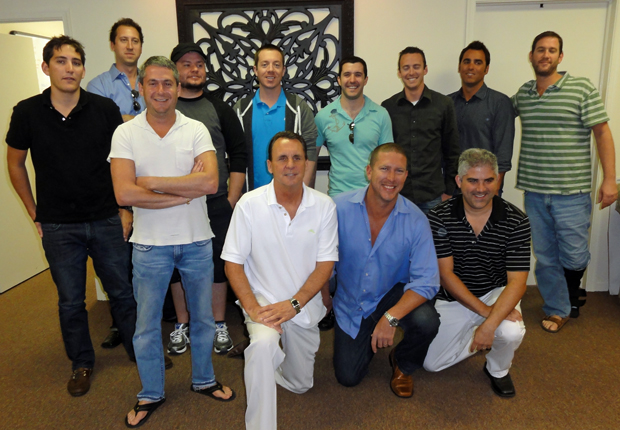
John
Ferber (standing in white shirt at left) with
other members of the Domain Holdings
Group team in a photo we snapped on an April 2011
visit to their Delray Beach offices.
"To me we are
just in the infancy of the history of domain
names. I
admire and appreciate how many different strategies
and methods those in the industry have developed
centering around domains. Some amass tremendous
portfolios and make their living buying and selling
domains, others focus on quality versus quantity and
own a few but spend more time and resources developing
them, some do both. There is no right or wrong
strategy to pursue - some people may find they are
better at buying/selling while others are better to
develop them," Ferber noted.
"Regardless I think it's indisputable
that a developed domain is almost always more valuable
than one undeveloped. As such I think we are
starting to see the next phase in the industry, where
solutions providers such as Domain Holdings Group and
others are working tirelessly to develop the platforms
that enable Domainers to more easily develop and
maximize the value of their domains in a fashion that
is as easy to implement as traditional parking
solutions," Ferber said.
|
"I also think
domains will
increasingly become the center point of an expanding
world, where things like Domain Centric Mobile apps,
social media applications, vanity email applications,
etc. all contribute to the overall value of a
domain name and the domain name is the centralized
point of it. I think we'll start to see major Fortune
500 companies increasingly realize how important |
|
it is
to own key product oriented domains relative to their
lines of business. I was speaking to a senior
level executive of a retailer recently and was
fascinated in how interested they were in the concept
of owning the key domain name for one of their largest
product categories. For less than the cost of opening
a new store they can forever own the .Com in something
they spend 10's of millions a year advertising,
etc.."
"Like in every industry, the only constant
is CHANGE, and as such I expect the Domain Industry to
continue to evolve and become increasingly more
sophisticated and there will be more solutions than in
the past that will work to create increased value for
portfolio owners," Ferber predicted. "At Domain Holdings Group we
think about a domain in terms of Life-Cycle
Management. What's the value of a domain today, what's
the maximum value that can be achieved and when and
how is the right time to dispose of it. How many
times have you the reader sold a domain for what you
thought was a great/top price, only to realize later
you sold it for way to cheap, too soon?
I look forward to working with everyone in the
industry to help take the industry to its next level
and help every domain owner realize the maximum
potential they can out of their portfolio,"
Ferber said. |
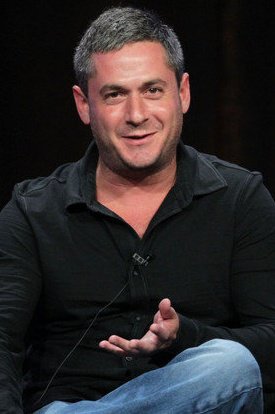
|
In
addition to Domain Holdings Group, Ferber is staying
busy with a number of other business ventures. He
noted that he is the kind of person who has to be
doing something - but some will undoubtedly wonder why
someone with his options is still going to the office
to work on multiple enterprises every day. To that
question Ferber replied, "I simply
love
working with other talented individuals and feeling
like you are creating value and technology and
solutions for people that they use and appreciate."
"My other companies
include USONetworks (a company I
co-founded) and an affiliate, Car-Merical.
They are pioneers in an emerging field called Video
Search Engine Optimization (VSEO). Just like companies
desire to rank in the tops of the search engines, they
are increasingly realizing how important an effective
Video Marketing Strategy online is to have as well.
The second largest search engine in the world is YouTube and videos are also on the results pages on
Google, Yahoo, etc. So understanding this for our
clients is what the company specializes in. We also
have a full video production studio and do a lot of
custom production work, particularly in the automotive
industry."
|
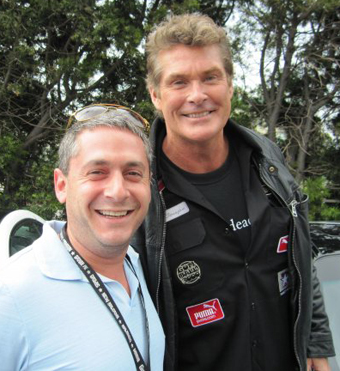
John
Ferber and actor/singer David
Hasselhoff |
"The other company is called
MyMojo
and
primarily focuses on providing internet marketing
services for celebrities. They have also been
developing a very cool technology platform for
marketers that helps them pick the right endorsers
based on more than 100 data points. It's in its
infancy but it's very fascinating stuff to me and
hopefully to marketers as well. Erik Simons runs MyMojo and USONetworks, and
Karry Moore and Joseph Leblanc run Car-Mercial. I'm
also on the board of a company in Baltimore called
DoublePositive which is one of the largest Hot
Transfers companies in the world (a hot transfer is a lead in the
form of a live person being transferred to a sales
agent), and lastly I proudly serve
on the board of my brother Scott's company, TidalTV.com, one of
the leading Video Advertisement companies in the
world," Ferber said.
As
excited as he is about his new commercial ventures,
the project closest to Ferber's heart is the |
|
pioneering charity fundraising site he founded at Microgiving.com.
"I've always been charitably inclined, if that is a
word, and at the same time as I got older I noticed I
became a little jaded with the traditional concept of
donating to a charity because it wasnít very
fulfilling to me," Ferber said. |
"A few events led up to the idea for
Microgiving. The first was 9/11, and as
my
colleagues and I, like everyone else, were watching the
tragedy unfold live on TV and the aftermath it
occurred to me that there wasnít an easy way to
directly help a victim or a victim's family from
9/11.
Then came Hurricane Katrina. I was down in Florida
when it happened, and when Katrina first hit landfall,
the eye of the storm passed directly over my house as
a category 1 hurricane. I had some friends in town
that weekend and while I normally always have CNN on
in the background, this one weekend I didnít until
literally Katrina was making landfall as a category 4
or 5 hurricane in New Orleans and like everyone else
watched helplessly on TV as Katrina left a path of
devastation in its wake. I immediately donated to
the Red Cross, and then started thinking of driving up
there to help people on the ground but if you recall
in the near term after Katrina, there was lots of
confusion and people thought it was too dangerous to
go to New Orleans with reports of looting and
random crime, etc."
|
A
tragic incident that hit even closer to home also
played a major role in the genesis of Microgiving.com.
"In 2004 my Sister-In-Law,
who had Cystic Fibrosis, passed away after receiving a double lung transplant.
After she passed I
started donating to CF, but I also wanted to helpsomeone directly who had CF and I looked around and
just couldnít find an easy way to do so. Then in
2006, Muhammed |

|
|
Yunis won
the Nobel Peace Prize for
Micro-Lending, which is the issuance of small loans to
people who traditionally had no access to them. In
the USA
most people have never heard of Micro lending, but
it's incredibly popular in third world countries and
has been hailed as one of the most positively
transformative inventions of the 20th century,"
Ferber said. |
"Reading about Yunis, a simple thought occurred to me
- a platform online that would enable people who
wanted to help others find people in need, and people
in need the ability to find help from people willing
to help. I envisioned it as a cross between Match.com
and Facebook and in January 2008 Microgiving.com was
launched," Ferber noted. "The first 2.5 years was fairly
slow as we launched at an interesting time when the economy was
collapsing around us. People found themselves in
tremendous need, however at the same time, the level
of donations charities received dropped as a function
of the economy as well. So we had lots of people
looking for help and not that many people willing to
help."
|
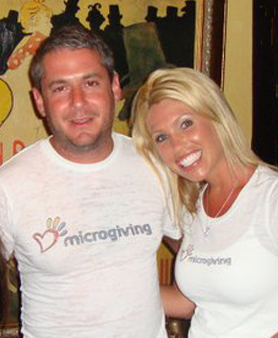
John
and Jenna spread the word about Microgiving.com
at a Secret Millionaire
viewing party in Florida (March 2011)
(Photo courtesy of Barbara Neu) |
"About 9 months ago we decided to
enhance the mission
of Microgiving. Until that point the platform was
solely used by people experiencing financial
hardships, whether it was loss of job, domestic
issues, medical, etc. We opened
the platform to anyone who wanted to raise money for
anything, and as such we've grown about 10x more since
then. It's worked out amazingly well because we now
access a small fee on all donations and use that fee
to donate to the people who need help the most and are
really struggling, so overall we're helping more
people than we ever have in the past. I still
fund the overall operations and our next goal is to
become self-sustaining/sufficient and I plan to
continue to fund it until we do so," Ferber said.
"Since launching
we've been able to help thousands of people and it's
been an incredibly rewarding experience for all of us
involved. There is nothing better than receiving an
email of thanks from someone whom we've helped be able
to receive life-saving surgery, stave off foreclosure,
leave an abusive relationship, provide temporary
assistance due to loss of job/income, etc. As well
now we are helping musicians and artists and
inventors and community volunteers and non-profits and |
|
so much more receive funding to help them in
their goals. If you know someone who can benefit by
using the Microgiving
crowd funding platform,
please help spread the word!
|
Ferber's
philanthropic efforts were most recently recognized by
ABC-TV when they featured him in the March 27, 2011
episode of Secret
Millionaire. The program showed Ferber
reaching out to needy people and organizations in Los
Angeles's infamous Skid Row area. We asked
Ferber how his appearance on the telecast came about
and how the experience impacted him.
"About 18
months ago I was contacted by a journalist from a
magazine called 944," Ferber said.
"It's only distributed in a few
cities and I hadn't heard of it. He was doing an
article on successful people under the age of 40 and
asked if I'd mind being a part of it. I said sure and
he emailed me a list of about 10-20 questions. Well
I was busy at the time and actually forgot to respond
to him and basically never thought about it again.
Fast forward a few months later and a casting producer
from ABC had contacted me about being on the show. I
asked him how he found me and he referenced the
article in 944 magazine - the journalist had still
included me even though I hadn't responded to his
questions!"
|
"The casting producer sent me some links
to a few of the episodes that had run in the UK
(the
show originated there about 6 years ago). I watched
them over a weekend and was really impressed by the
spirit of the show and the impact that the
participants had on the recipients of the show and was
proud and honored to be asked to be a part of the US
version. I was also interested in seeing if I could
learn and get ideas on how to improve and grow
Microgiving, so I signed up."
"Being on the show
has had an impact on me in a variety of ways. The
theme of my episode was homelessness, and while I am
fortunate to never have found myself homeless, the
experience really opened my eyes to the causes of
homelessness as well as enabled me to become more
compassionate and understanding to people who find
themselves in that situation. For instance it never
occurred to me that people could be homeless because
of domestic violence. One of the woman I met while
shooting the episode was a lovely mother of 3
beautiful young kids, whose father kicked her and the
kids out of their house on Christmas Eve and suddenly
she found herself homeless on perhaps one of the most
family oriented days of the year. I think a lot
of us are cynical when we pass a homeless person on
the street and are quick to blame them as a victim of
their own circumstances but what I learned and would
love to impart is that everyone has a story of how
they got to where they are and it's best not to judge
before you heard the story."
|
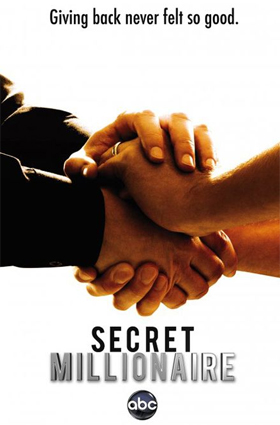
|
"The appearance has
also raised the awareness of Microgiving and thousands
of people visited Microgiving and learned more about
it and signed up or donated since the show aired. As
for me, I had my 15 minutes of fame and am happy to
retreat to my relative anonymity and focus on helping
people and building businesses and enjoying life as
much as I can," Ferber said.
|
When
it comes to enjoying life Ferber pursues a number of
outlets for his energy as well - one of them being
playing guitars - he has a fabulous collection
of them hanging on the walls of his Florida home. "I've been playing guitar since I was
10 years old, so
27 years now, however |
|
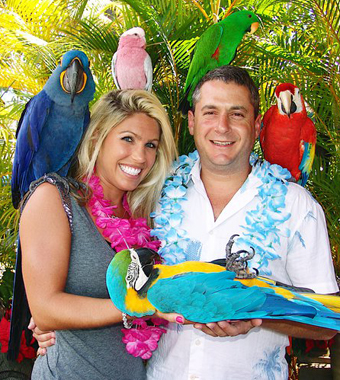
John
and Jenna on a visit to Hawaii |
I consider myself still an amateur,"
Ferber said. "I can somewhat handle my own on rhythm, but I
have friends who started later than me and can really
jam out and I admire them for their skill. I love going to
concerts, I've
probably been to more than 500,' Ferber said.
"I
also have a
lot of hobbies that I kind of scratch the surface on.
I recently painted my first painting and sold it with
the proceeds benefiting the Microgiving Foundation and
am excited to do some more in that arena. I'm also
currently working on my pilotís license and just
recently started soloing. I can't express how
exciting and exhilarating it is to be up in the air in
a machine soaring through the sky all by yourself. I
love scuba diving, swimming, basically anything to do
with water, boating, volleyball, the beach, etc. I
enjoy traveling and spending time with my girlfriend
Jenna and our two dogs, as well as with my family,
brothers, parents and friends," Ferber
concluded.
|
|
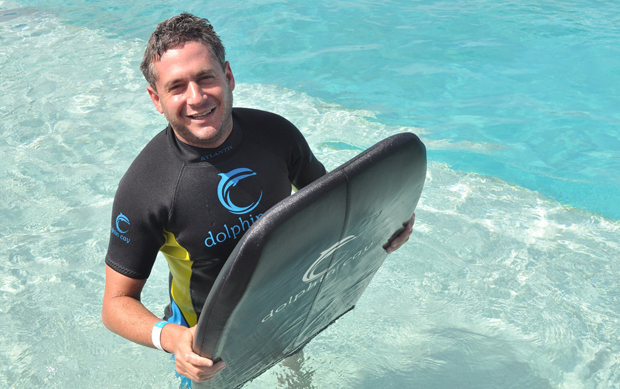
John
Ferber ready to catch the next wave in the
Bahamas. |
Fortunately
for this industry, Ferber has widened his
circle of friends and professional colleagues to
include those who share his passion for this business. The
good work he is doing to provide more options for
domain owners and a better life for his fellow man
make John Ferber a welcome addition to what
remains one of the world's most exciting young
industries.
*****
Postscript:
This story is dedicated to Cody, now
departed, whom John described as his "best friend
for 15 years" (a close up photo of Cody
still hangs on John's office wall).
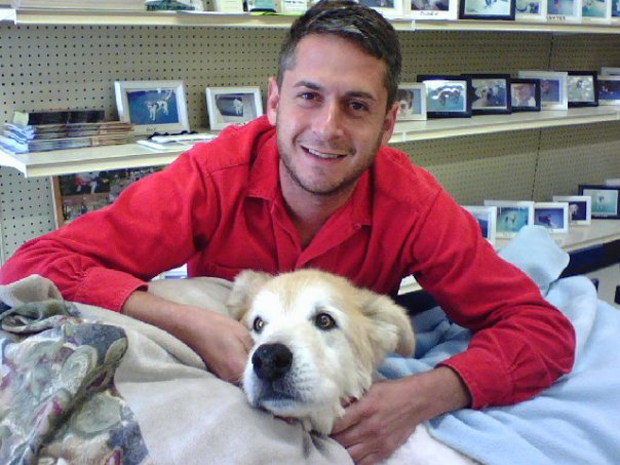
John
Ferber and Cody
|



